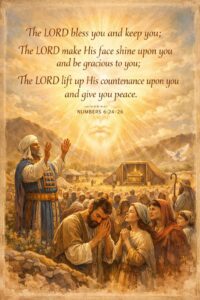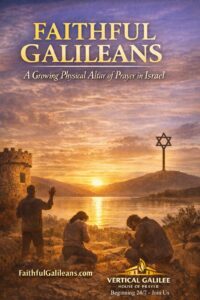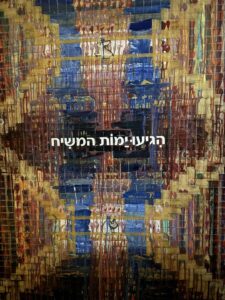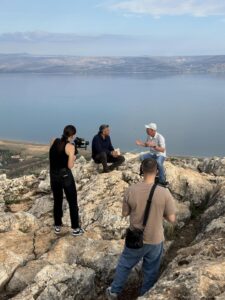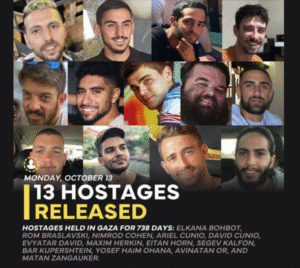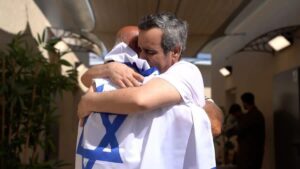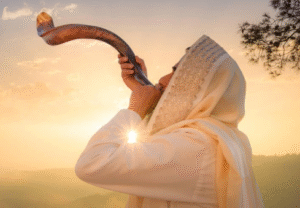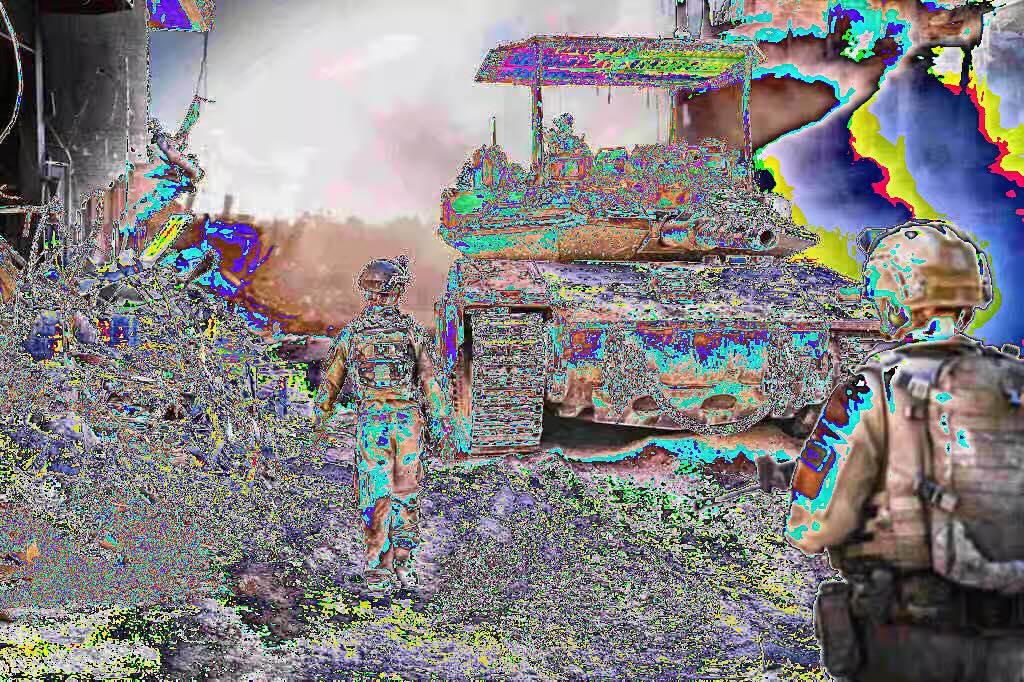
The Feasts of the Lord foreshadow the life of messiah
The Feasts of the Lord are not merely ceremonial observances or relics of the past; they are divine appointments set by Elohim, rich in meaning and prophetic significance.
These sacred festivals were instituted by Elohim to be a blueprint for His redemptive plan for humanity, offering deep insights into the nature of His relationship with us. Each feast points to significant events in the life of Messiah Yeshua and highlights His role as the ultimate fulfillment of these divine promises.
These sacred festivals were instituted by Elohim to be a blueprint for His redemptive plan for humanity, offering deep insights into the nature of His relationship with us. Each feast points to significant events in the life of Messiah Yeshua and highlights His role as the ultimate fulfillment of these divine promises.
Understanding these feasts can deepen our appreciation of Elohim’s timeline for the world and our individual lives as believers.
In the days of ancient Israel, the High Priest played a critical role during these feasts. During the Feast of Firstfruits, the priest would lift the Omer, which was the first sheaf of the barley harvest, as an offering to Elohim. This act symbolized the presentation of the first yield of the harvest to Elohim, sanctifying the rest of the crop. The imagery of lifting the Omer is a powerful foreshadowing of Messiah Yeshua being lifted up on our behalf, becoming the firstfruits of the resurrection.
As it is written, “But now is Messiah risen from the dead, and become the firstfruits of them that slept” (1 Corinthians 15:20). Just as the Omer was waved before Elohim as an offering, Yeshua was lifted up, crucified, and resurrected to offer new life to all who believe in Him.
This redemptive act of Yeshua extends even to the great figures of the past. For example, some theologians suggest that Yeshua’s role as the one who brings forgiveness to Elohim’s servants may extend to figures like Moses, who, despite his moments of failure, found grace in the eyes of Elohim. It is consistent with Yeshua’s mission to bring forgiveness to all who serve Elohim, including those from Israel’s past.
A critical aspect of the prophetic nature of the Feasts of the Lord is the mystery surrounding the timing of Yeshua’s return. The concept that “no one knows the day or the hour” (Matthew 24:36) is deeply intertwined with the Feast of Trumpets, or Yom Teruah, which is unique in that it begins on the first day of the seventh month, a day marked by the appearance of the new moon.
This uncertain timing mirrors Yeshua’s teaching that His return will come at an unexpected hour, likened to a thief in the night. As believers, we are to remain vigilant, living lives that glorify the Father and being ready for that day when we hear the shout, “Baruch Haba B’Shem Adonai” – Blessed is He who comes in the name of the Lord.
This uncertain timing mirrors Yeshua’s teaching that His return will come at an unexpected hour, likened to a thief in the night. As believers, we are to remain vigilant, living lives that glorify the Father and being ready for that day when we hear the shout, “Baruch Haba B’Shem Adonai” – Blessed is He who comes in the name of the Lord.
Elohim’s calendar, which revolves around the feasts, is divided into two main seasons: the spring and the fall. These seasons mark significant prophetic events.
The spring feasts, which include Passover (Pesach), Unleavened Bread (Chag HaMatzot), Firstfruits (Yom HaBikkurim), and Shavuot (Pentecost), have already been fulfilled in the first coming of Yeshua.
The fall feasts – the Feast of Trumpets (Yom Teruah), the Day of Atonement (Yom Kippur), and the Feast of Tabernacles (Sukkot) – point to His second coming and the culmination of Elohim’s plan for redemption.
The spring feasts, which include Passover (Pesach), Unleavened Bread (Chag HaMatzot), Firstfruits (Yom HaBikkurim), and Shavuot (Pentecost), have already been fulfilled in the first coming of Yeshua.
The fall feasts – the Feast of Trumpets (Yom Teruah), the Day of Atonement (Yom Kippur), and the Feast of Tabernacles (Sukkot) – point to His second coming and the culmination of Elohim’s plan for redemption.
Interestingly, the first day of the biblical year, Aviv (Nissan), though not marked by a specific feast, holds significant importance in Israel’s history.
Exodus 40:2 records that Elohim instructed Moses to set up the Tabernacle on the first day of the first month. This moment signified the completion of the Tabernacle, a dwelling place for Elohim among His people. The construction of the Tabernacle, and its readiness by the first of Nissan, highlights the importance of preparation and readiness for Elohim’s presence.
This theme of readiness carries over into the writings of the Apostle Paul.
In 1 Thessalonians 4:16-18, Paul reminds believers that Yeshua will descend from heaven with a shout, and the dead in Messiah will rise first, followed by those who are alive and remain, who will be caught up together with them in the clouds to meet the Lord. This event, known as the rapture, is a moment of transformation where believers will receive new bodies in the twinkling of an eye.
Until that day, we are called to use the life we have to glorify the Father and to honor Him in all that we do.
In 1 Thessalonians 4:16-18, Paul reminds believers that Yeshua will descend from heaven with a shout, and the dead in Messiah will rise first, followed by those who are alive and remain, who will be caught up together with them in the clouds to meet the Lord. This event, known as the rapture, is a moment of transformation where believers will receive new bodies in the twinkling of an eye.
Until that day, we are called to use the life we have to glorify the Father and to honor Him in all that we do.
The unexpected nature of Yeshua’s return calls us to remain alert.
Matthew 24:42-48 emphasizes this point, warning believers to watch and be ready, for we do not know the hour in which the Son of Man will come.
Yeshua describes the faithful and wise servant who is found doing the will of his master upon his return. This call to faithfulness resonates with the role of the believer in every generation: to be about the Father’s business, preparing the world for the coming of the Messiah.
Matthew 24:42-48 emphasizes this point, warning believers to watch and be ready, for we do not know the hour in which the Son of Man will come.
Yeshua describes the faithful and wise servant who is found doing the will of his master upon his return. This call to faithfulness resonates with the role of the believer in every generation: to be about the Father’s business, preparing the world for the coming of the Messiah.
Despite the turmoil and decay in the world, we must not fall into the trap of thinking that Elohim is indifferent. Yeshua’s return will bring about a restoration of all things. In contrast to the evil servant who says in his heart, “My Lord delays His coming,” we are to live each day as though Yeshua could return at any moment, serving with love and diligence, knowing that Elohim is deeply involved in His creation.
The Apostle Paul’s exhortation in 1 Thessalonians 5:1-5 reminds us that we are children of light, not of darkness. The day of the Lord will come as a thief in the night for those who are not watching, but we are not in darkness.
We know that Elohim’s plan is moving forward according to His appointed times. The feasts are a reminder that Elohim’s redemptive work is unfolding in history, and we are to live in light of this truth.
We know that Elohim’s plan is moving forward according to His appointed times. The feasts are a reminder that Elohim’s redemptive work is unfolding in history, and we are to live in light of this truth.
However, the journey of faith is not without its challenges. It is easy to grow weary, to neglect prayer, or to forsake fellowship with the Kehilah (the community of believers).
When we distance ourselves from the words of life, we fall into spiritual slumber. Yet, we are called to be full of life, full of the Spirit of Elohim, and to live out the plan He has for each of us. Being in the world without losing sight of our heavenly calling requires a constant return to the source of life: the Word of Elohim and the power of His Spirit.
When we distance ourselves from the words of life, we fall into spiritual slumber. Yet, we are called to be full of life, full of the Spirit of Elohim, and to live out the plan He has for each of us. Being in the world without losing sight of our heavenly calling requires a constant return to the source of life: the Word of Elohim and the power of His Spirit.
As Paul writes in 1 Thessalonians 5:1-11, we are to encourage and build one another up, reminding each other of the hope of salvation. We have not been appointed to wrath but to obtain salvation through our Lord Yeshua, who died for us. Whether we are awake or asleep, we live together with Him. Therefore, we are called to comfort and edify one another, watching and remaining sober, putting on the breastplate of faith and love, and the hope of salvation as a helmet.
Yeshua’s own words in John 14:1-5 give us further assurance. He promises that He is going to prepare a place for us, and He will come again to receive us unto Himself. This promise is not only a comfort but a motivation to live in readiness, knowing that we are destined for eternity with our Messiah.
The Apostle Paul, at the end of his life, could say with confidence, “I have fought the good fight, I have finished my course, I have kept the faith” (2 Timothy 4:6-8). This should be the goal of every believer: to live a life of faithfulness, so that we too can say we have fulfilled the mission Elohim has given us.
But living a life pleasing to Elohim requires discipline. Yeshua teaches us that if we love Him, we will keep His commandments (John 14:15-23). Love for Elohim is not merely an emotional response; it is demonstrated through obedience. As believers, we must seek Elohim’s will for our lives, just as we would seek to know the heart and desires of a spouse in marriage. This relationship with Elohim requires constant communication, study of His Word, and a willingness to submit to His plans for our lives.
In the practical sense, James 1:22-27 urges us not to be hearers of the Word only but doers of the Word. Elohim’s instructions are not just to be understood intellectually; they are to be lived out. Pure and undefiled religion before Elohim is to care for the vulnerable, like the fatherless and widows, and to keep oneself unspotted from the world.
One of the greatest barriers to fulfilling Elohim’s will in our lives is unforgiveness. Holding onto grudges and past hurts can prevent us from experiencing the fullness of life that Elohim intends for us.
But Yeshua offers a path to healing and restoration through forgiveness. The story of a man filled with hate for his father illustrates this truth. After hearing a message on forgiveness, he went to his father’s grave and released the anger he had held onto for so long. His wife saw the transformation in him, and he became a new man.
But Yeshua offers a path to healing and restoration through forgiveness. The story of a man filled with hate for his father illustrates this truth. After hearing a message on forgiveness, he went to his father’s grave and released the anger he had held onto for so long. His wife saw the transformation in him, and he became a new man.
Elohim’s Spirit within us can empower us to forgive and let go of the pain we carry
SEEK HIS FACE CONTINUALLY
SEEK HIS FACE CONTINUALLY Light, Grace, Presence, and the Face of Elohim The heart of…
Fasting, the Heart, and the Return to Elohim
Fasting, the Heart, and the Return to Elohim A Hebraic understanding of Consecration, Repentance, and…
Ein yi’ush ba-olam klal
Ein yi’ush ba-olam klal אין ייאוש בעולם כלל“There is no despair in the world at…
FROM PROVISION TO PRESENCE
FROM PROVISION TO PRESENCE THE WAY OF THE MESSIAH, THE DWELLING OF ELOHIM, AND THE…
The Circle of Authority, the River of Life, and the Kingdom of the Messiah
The Circle of Authority, the River of Life, and the Kingdom of the Messiah Encountering…
Hanukkah Light, Sonship, and Covenant Faithfulness
Hanukkah Light, Sonship, and Covenant Faithfulness Why the Sons of Elohim Must Not Shrink Back**…
Hanukkah: Shining the Light on Our Thoughts
Hanukkah: Shining the Light on Our Thoughts How Thoughts Enter Our Lives, Shape Our Hearts,…
The Lamb, Mount Zion, and the Mystery of the Song
The Lamb, Mount Zion, and the Mystery of the Song The Lamb, Mount Zion, and…
Awake, O Sleeper — The Five-Alarm Fire of Awakening
Awake, O Sleeper — The Five-Alarm Fire of Awakening May we hear Elohim like Shmuel…
Anointed to Heal, Restore, and Rebuild: A Prophetic Call to the Kehilah
Anointed to Heal, Restore, and Rebuild: A Prophetic Call to the Kehilah The Anointing of…
What is called the "Gaza War"
What is called the “Gaza War” In which Israel faced attacks on 7 different military…
Why Do the Nations Rage?
Why Do the Nations Rage? (Psalm 2, Prophetic Scriptures, and Our Hope in Yeshua the…

